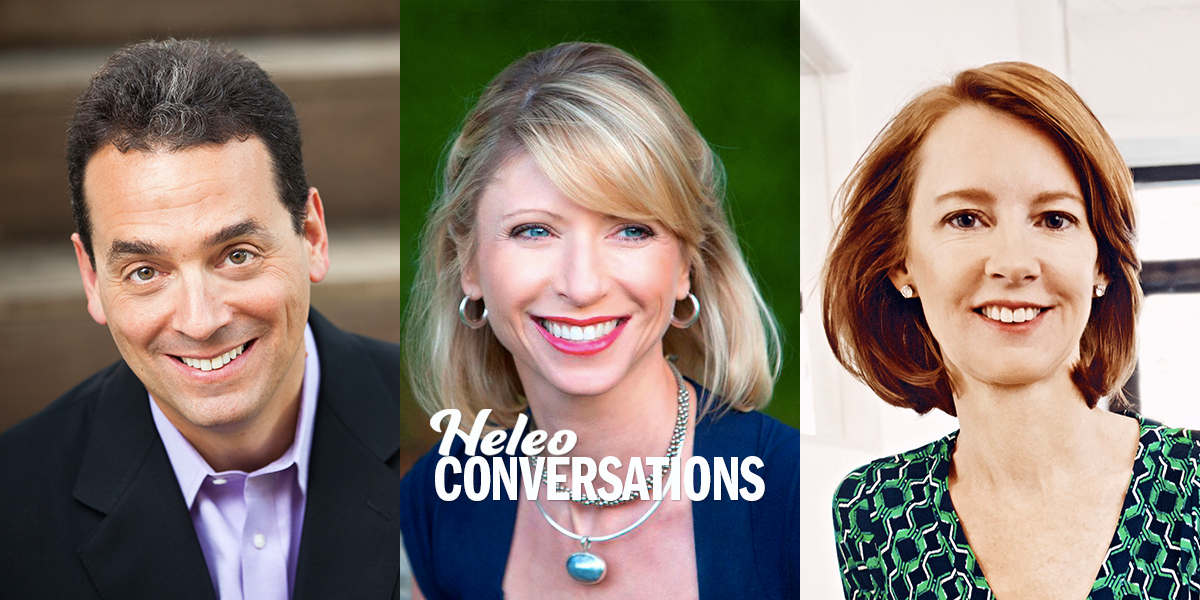In this exclusive Heleo conversation, management expert Daniel Pink (Drive), happiness and habits expert Gretchen Rubin (The Happiness Project) and social psychologist Amy Cuddy (Presence) met up via free Skype Meetings to discuss the art and science of working remotely. Joining in from Washington D.C., New York City, and Boston, the three bestselling authors talked about how best to communicate and collaborate from a distance, as well as offered up useful advice for aspiring entrepreneurs. (Their conversation has been edited and condensed slightly for clarity. Read transcript below or watch a video excerpt.)
Dan Pink: What strategies do you have to stay motivated and accountable when you’re not working in an office environment?
Gretchen Rubin: One of the things that’s really important is accountability. When you’re in a traditional office setting, accountability is pretty automatic. You have a boss, you have colleagues, you have deadlines — your productivity is driven by them. Many people, when they leave that kind of environment, miss its architecture of accountability. If you’re somebody who finds yourself paralyzed, or things aren’t happening as quickly as you’d like, it helps to find some kind of accountability, whether that’s getting a client or doing volunteer work — so that you have a client, even for free. Get an executive coach. Meet with a group of people who are going to hold each other accountable.
Dan: Amy, what do you think about that? With the nature of your job as a professor, you probably move between an office environment and a non-office environment.
Amy Cuddy: I move among many different environments. There are no two days that look the same. That can be really tough. One of the key things when working at home is how our space affects us. You need to find the place in your house that feels the most comfortable to you, one that you don’t associate with watching TV or having difficult conversations with your family. It’s got to be the place where you work, where you feel focused. It can be a little corner, but it’s got to be your corner. Then leave it at the end of the day. It cannot be mixed with your personal life. That is really critical.
Gretchen mentioned a number of things that are really important. One I want to underscore is having a group of people that keep each other accountable. Maybe you all meet a couple times a week at a local coffee shop to check in with each other. Have a couple goals every week and share them. Make sure they keep you on track. Be tough on each other.
Gretchen: Another thing that’s important is to put yourself in a work frame of mind. Don’t stay in your pjs. Put on an outfit so you’re ready for the day. A lot of people will give themselves a commute, even if it’s just walking around the block, saying, “I’m leaving home. I’m coming back to my house, but now I’m at work.” I had a friend who worked in a studio apartment and he had a rule that he could never sit or lie on his bed during his workday. He knew once he was on that bed, it was just all over. He mentally separated his workday. That idea of a commute or some kind of transition can be helpful.
Amy: Walking is also important. There’s so much evidence now that moving, walking in particular, improves your cognitive function, your executive function, your creativity, your sense of confidence. You need to get out and take those walks. Maybe you can use those as transitions between tasks. If you stay in the house all day, you don’t have that separation between your home life and your work life. You need to get out at the beginning and the end of the day, and maybe in the middle as well.
Dan: I’ve been working for myself for 19 years, and I’m always a little bit puzzled by the accountability question. How do you stay accountable? If I don’t get stuff done, my family doesn’t eat. That’s a decent amount of accountability right there. If you talk to small business owners, they actually like that level of accountability. They like knowing that they’re on the line.
One of the practices I use to stay motivated and to do better work, especially when I’m writing, is to treat the job like a bricklayer. I come in at a certain time each day. I have a certain number of words that I need to hit. I don’t go anywhere until I have laid all of those bricks. Then I come back the next day and lay some more bricks. There are no exceptions. There is no calling in sick. That ends up being a pretty good practice.
Trending: How to Transform Daily Habits into Life-Changing Rituals
Gretchen, you said you work sometimes in your house and sometimes in other venues. How do you make that decision?
Gretchen: I do a ton of stuff on social media — most of that is at my house. I have my three monitors, my cockpit where I’m writing a blog post, I’m getting a podcast ready, I’m on Twitter or Facebook, etc. When I want to do a significant chunk of original writing, I’ll either go to a coffee shop or to a library that’s just a block from my house.
I’ve always found libraries are great environments. This is another thing for people to think about. Look back to when you’ve worked well in the past. Are you better off in a big bustling place? Or do you need total silence? Do you like to be in a place that’s got a lot of visual stimulation? Get yourself there.
One of the dangerous things about working from home is there are all kinds of different work that you can procrastinate with.
For me, a library is the most thought provoking, supportive environment. I’m lucky that I live so close to one. I like it because it is sort of a commute. I say, “I’m going there. I’m going to work there for 3 hours. I’m going to write.” And then I’m stuck. “I’m here for 3 hours and there’s nothing else for me to do.” One of the dangerous things about working from home is there are all kinds of different work that you can procrastinate with. “I need to clean out this file. I’ll stick in the load of laundry. I’ve got to do some research.” When I’m in the library, that’s it. There’s nothing else for me to do. I’m not connected to the internet. If I’m not writing, then I’m just staring into space. Just out of fear of boredom, I’ll start to work. Once I start to work, I get into it. I like doing that, getting myself to the kind of place that suits me best.
Dan: I used to work on the third floor of my house. I’m so glad I don’t do that anymore. Even though my kids at the time were little, they knew if you wanted to come in, you had to be really quiet. Especially if Dad was on the phone, then you couldn’t come in at all. They were little ducklings indoctrinated into that way of dealing with things. The work-home connection was too tight. Now, my office is a converted garage. My house is right there. I have a 22-step commute. Those 22 steps are a cleanser. I’m one person in here, and I’m a slightly different person in there. That soft separation seems to be the way to go.
Gretchen: A friend of mine compares his family to television. He says if your family is around, even if they’re not talking to you, even if you’re not paying attention to them or on duty, it’s like a television is playing somewhere in your mind, and it’s distracting. Even having that little bit of separation is a relief.
Amy: You sort of touched on this, Dan, but you don’t want your family to feel like they’re coming into your work environment. They deserve to feel like they have a home that’s their space. That soft separation isn’t just to protect you from the distractions of home life, but also to protect them from the distractions of your work life.
Dan: That’s a very good point. Similarly, one tactical thing that I do — I’m a disciple of David Allen and Getting Things Done — is I have an inbox in my house. Anything work-related goes in that inbox. It doesn’t go anywhere else, not in the living room or kitchen. It all goes in that one confined space.
Amy, when working remotely, how can we communicate effectively and with presence?
Amy: First, get your technology straightened out. Build in the time to do that in advance. Many of us are guilty of not doing that because it feels like we’re giving away time, but it’s important. Second, don’t have distractions in the background. Make sure your dog isn’t running through the room. Make sure that people know you’re in this room having a conference call at this moment.
Third, make sure that you are looking into the camera, that you’re making eye contact. Don’t be looking around your room. Certainly don’t type on your laptop. I don’t want to hear papers rustling. I want to know that you are fully present in this meeting, just as you would be in person. You wouldn’t be typing away on your computer when you’re at a meeting in a small conference room. Behave the same way. Don’t be the person who is distracting everyone else because you are distracted.
Gretchen: One of the challenges about working remotely is when you’re communicating with people, it’s not easy to know when to jump in to the conversation. When you’re sitting in a room with someone, you have visual cues about when one person is getting ready to jump in. It happens seamlessly. When you’re remote, that isn’t present. Part of the solution is just to be patient. Let awkward pauses fall sometimes so that people can come in. Be aware of needing to direct the conversation like, “Hey Dan, Hey Amy,” because someone may not feel comfortable just jumping in. Cues that are very comfortable when we’re in person are tougher when we’re working remotely.
Dan: We’ve talked about some of the communication troubles, but what are some pitfalls when you’re working on a shared project remotely?
Gretchen: Ball dropping is a problem in the workplace in general. But especially when you’re not running into each other in the halls or showing up at staff meetings together — sometimes people just won’t follow through. People may feel like, “It’s not a deadline, it’s a reminder.” Simply executing, being very clear about when something is expected to be done and following through with that. Doing your part and responding.
Trending: 5 Reasons Life Gets Better After Your 40s
I work with a lot of different people on a lot of different tasks. I have to tell myself, “No one’s going to be sending me lots of reminders. I need to be on it because I want things to move forward.” I’m my own worst enemy if I end up being the person who delays because I’m not reviewing something, or I’m not sending necessary information that I said I would. Keeping the ball rolling, even for easy tasks, makes a huge difference in how easily something gets executed.
Research has made it very clear that you do need a team leader. Teams that try to be flat don’t work.
Amy: To add to that, if you’re working on a team project, the research has made it very clear that you do need a team leader. Teams that try to be flat don’t work. They have to re-launch with a team leader. That team leader needs to be annoyingly predictable and consistent about communication. Every Monday an email goes out saying, “This is what we’re doing this week. This is what we did last week.” Every Friday you get, “Here’s what happened this week. Here’s what we’re doing next week.” Somebody needs to be very consistent. It needs to be the same person. Everyone needs to know to expect that.
The other thing to keep in mind is that when you can’t see each other, you make negative dispositional attributions about why things happened. Be aware of that human bias. Instead of attributing someone’s action to a dispositional flaw, consider that maybe there’s something situational going on. You just can’t see it. So make sure to have direct, honest, clear conversations. If there is resentment building up, you need to air that stuff out early. It can really build up and then you create this monster — when really it’s just a person who had to attend to something else outside the house that week.
Dan: Are there certain things that every business owner should do every day?
Gretchen: One of the things I learned from my study of habits is that there’s practically nothing that applies to everyone. We’re searching for the 7 secrets and the 1 essential tip. But often, the kind of thing that will work for one person is exactly the opposite of what would work for someone else. You might say, “If it’s really important, get up and do it first thing in the day,” but if you’re a night person, you’re going to be at your most productive and creative and energetic much later in the day. That’s bad advice for you. There’s not much that’s universal except I do think that everyone does better on a good night’s sleep.
The best way to start your day is to have a good night’s sleep the night before. Be realistic about how much sleep you need. Those short sleepers who only need 3 or 4 hours a night are extremely rare. It’s unlikely that you are one. If you’re jacking yourself up on caffeine, if you take naps, if you have massive sleep bouts in the weekend, you’re probably overtired. Most adults need at least 7 hours of sleep a night. It’s very hard to be at your most productive and energetic and decisive and tolerant and creative if you’re running on sleep deprivation. If you’re a business owner, you are your own most important asset. Your ability to make decisions, to think clearly, is the most important thing that you have got going for you. If you’re not getting enough sleep, that’s not going to work over the long term.
Amy: I’m going to add on to the physical piece. The research is so clear now that the way we move and carry ourselves has an enormous effect on how we think. The research on exercise alone is overwhelming. Exercise helps us think more clearly, it makes us happier, it makes us better people, it makes us healthier… the list goes on and on. I couldn’t even begin to summarize that literature. Some kind of exercise is all you need. It doesn’t have to be a big thing. It could be a 15-minute walk to get your coffee from the local coffee shop.
You’ve also got to have good posture. When we slouch, we start to act like people who are clinically depressed. When we sit up straight, even for 2 or 3 minutes, it changes our mood. It changes our memory of positive versus negative events. Again, the list goes on and on.
Open your body, expand your body. Hold your shoulders back. Keep your chest open. Breathe deeply. When you do that, you are basically an animal that is communicating to its nervous system that you are safe, that you are not threatened, that you are powerful. Very simple things that you do with your body can change the way you think. Don’t slouch over your iPhone all day. Set a reminder every hour on your phone, “Check your posture.” You’ll get out of that habit. You will become very aware of your posture. Change those simple things. Start by sitting up straight.
Dan: Those are awesome. I second both of those. I don’t know how I could ever write anything without exercising. It’s mind-boggling to me.
Let’s zero in on some business advice. Let’s say someone out there is thinking about starting a business. Do you have any practical tips from your own writings, your own research and experience that could be useful to those folks?
First you need to focus on what’s missing before you can focus on whether or not what you create is worth creating. Businesses really are about creating.
Amy: I have one little piece of advice. If you’re thinking about starting a business, think about what problem your business is going to solve. Be very clear about what that problem is. Does a problem exist? Can you identify it? How are you going to fix it? First you need to focus on what’s missing before you can focus on whether or not what you create is worth creating. Businesses really are about creating. They’re about producing. Is there something worthwhile that needs to be produced? What are the simple problems? What are the things that need to be fixed that will make people’s lives easier?
Dan: If I can add to that, there are a couple of things that I’ve seen both from my own experience and in writing about this topic. One of them is that the fact that you’re good at something doesn’t mean you should run a business doing that thing. Sometimes those Venn diagrams intersect, but not always. At some level they’re very different skills. The second thing that I would offer to anyone who’s thinking, ” Should I go out on my own?” — and it may sound like the most mundane advice, but man, oh man, I’ve seen so many people fail because of this — is to keep your overhead low. I can’t emphasize that enough.
Trending: 5 Simple Strategies for Persuading Anybody
I see people go out and rent a fancy office space, they hire 3 people, they print a brochure, they build an elaborate website… suddenly, their carrying costs each month are massive. They have to work their butts off just to pay off their bills. For some reason, there’s this idea out there that there are certain trappings that every business must have — often very expensive trappings. There are certain things you shouldn’t skimp on. If you’re working with people, don’t skimp on talent. Don’t think of talent as a commodity. But on the other stuff… I haven’t had business cards for 9 years. In 19 years I haven’t had an office that wasn’t either in my house or behind my house. Not only am I not paying for an office, I’m deducting it. There are some times in life where cheapness is a strategic virtue.
Gretchen: Something else that can help if you’re starting a business is to think back to other times in your life when you were successful. What were the circumstances then? There might be clues for how you might set it up now. If you notice, “Every single time I did well I had a coach, or a partner, or a friend doing it with me,” then maybe you’re somebody who works better in a team. Maybe you want to think about getting a partner. Ask yourself things like, “Did I do better when I had a lot of freedom? Did I do better when I had a lot of accountability? Did I do better in a certain kind of setting? Did I do better when I had a gigantic goal or when I kept to very, very minor steps?
Often we don’t think about looking for patterns in how we succeeded before. You might as well glean as many insights as you can from the past so that you can inform the future.
Daniel: For our last question, I’m going to upload a PowerPoint. You guys have probably seen it. It’s the famous PowerPoint that Netflix did about its freedom and accountability culture. Netflix pays people well, gets out of their way and, interestingly, lets people have as much vacation time as they want. They figure it out themselves. What do you guys think of that kind of approach?
Amy: Cultures that are that idiosyncratic really need commitment from everyone to work well. It sounds like it does work well for Netflix. But I don’t think that you can simply adopt these idiosyncratic cultural pieces for just any company. It’s got to fit yours. You’ve got to have full-on commitment to that.
Daniel: On the Powerpoint they also say, “We’re a team not a family.” What do you think about that metaphor of companies as families?
Amy: There are a lot of people who talk about their companies as families. Again, for some companies, I think it does work well. With the idea of a team, however, everyone has a pretty clear role. There’s a concrete win that they’re going for. You can’t really have any free riders. With a family, there’s this implication that you can have free riders from time to time. With teams you can’t. You all have a role and you need to do it well. You can really never drop the ball.
Daniel: I find this a little refreshing because I’ve always been sort of skeptical about this idea that companies are families. If you’re not a family, it doesn’t mean you don’t like each other, care about each other, take care of each other. I just think the obligations to family are moral and biological in many cases, whereas a company is a bit different. I always raise my eyebrows a little bit at the company as family metaphor.





























